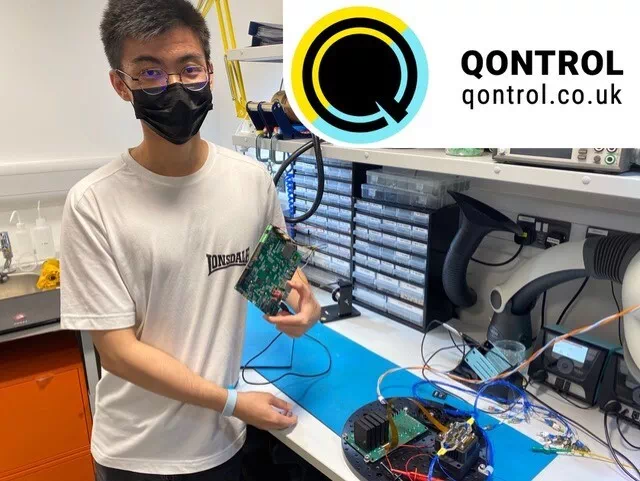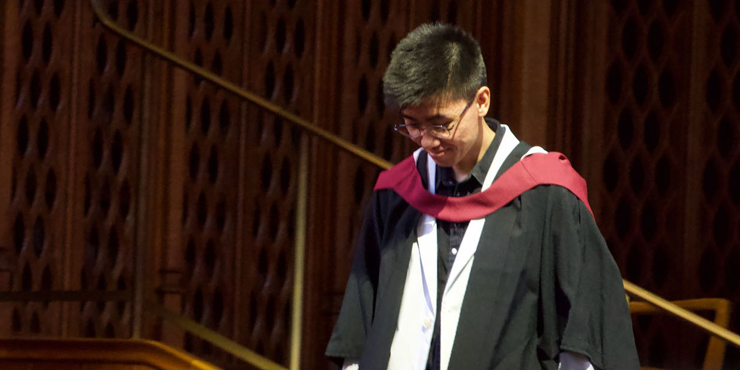From Dissertation to Employment: Advice from an MSc graduate
Zihang, a recent MSc graduate in Optoelectronic and Quantum Technologies from China, gained UK work experience through the University’s Industrial Project. Now an Application Engineer at Qontrol, a University of Bristol spin-out working with quantum photonics technology, Zihang shares his experience and tips for those looking to follow his path.
Tell us a bit more about the company that you now work for…
I currently work as an Application Engineer at Bristol-headquartered Qontrol, a company that produces driver and read-out electronics for worldwide institutions including universities, laboratories and research centres. The company has grown out of the University of Bristol and provides electronic products for large-scale photonics. Because photonics, especially integrated photonic chips, is an important field of development for quantum technology, Qontrol saw this as an opportunity to deploy its capabilities to provide effective solutions.
Let’s rewind to your university Industrial Project. How did that work?
The University offers several opportunities for students to collaborate with companies and establish industry connections, many of which include globally renowned employers, as well as some impressive local Bristol-based enterprises.
In my year, for example, the department provided a list of optional Industrial Projects and an introduction to the corresponding enterprises. Students could choose a project based on their personal interests and then apply for up to two Industrial Projects. Of course, this varies from year to year.
If you are accepted, the project is undertaken outside of the University but is largely the same as conducting research at the University. It’s a great opportunity to step out of the campus and get to know the company face-to-face, with the potential for future employment after your studies.
What happens after submitting an Industrial Project application?
In the weeks following your application, you can expect to receive an email outlining whether you have been successful in reaching the interview stage.
As for the interview itself, well this shouldn’t daunt you. It mainly involves introducing yourself, your motivations and enthusiasm for working in this field, and why you think you are a suitable candidate for this position. You can prepare well in advance!
In fact, I saw the interview as an opportunity to highlight my strengths and show off the cool things that are relevant to the project. These can be things that you have completed in either a professional or extracurricular capacity. For example, I previously created my very own drone and have some experience in embedded programming and circuit design, which aligned very well with the work undertaken at Qontrol.
And if the interview doesn’t go as planned, don’t be discouraged. Companies generally provide feedback which will enable you to learn and prepare for your next opportunity.
Finally, as part of the application process, you may be asked to provide a copy of your CV for preliminary review. If you need help with this, I highly recommend the University’s Careers Service or contacting your personal tutor.
Tell us a bit more about Industrial Project itself…
Generally speaking, your line manager at the company will most likely be your project supervisor. Each week, I would update my line manager on work progress via instant messenger or email and would organise to meet with them every other week for an in-person update. If I needed to flag any issues, my supervisor was always on hand to help and offer resolutions.

Towards the end of the project, if the company you have chosen is recruiting or wants you to stay, they may contact you in advance, or you can be proactive and ask if there are vacancies available. If this is the case, the easiest route to working in the UK is by applying for a Graduate Visa. However, if you want a Skilled Worker Visa, you will need to discuss specific requirements with the company separately.
After my Visa was approved, I signed my contract with Qontrol and officially became a working person in the UK.
What benefits have you experienced whilst working here?
My workplace is based within the Quantum Technologies Innovation Centre in Bristol, which is a very welcoming and familiar experience given that the first and second floors are both part of the University of Bristol.
I’ve made many great friendships in the office since being here, many of which include engineers working for other companies who share our building. We often meet for lunch or afternoon tea together, and a few colleagues even attended my graduation ceremony.
Outside of work, I continue to discover more hobbies. I usually enjoy cycling, and riding in the British countryside is particularly interesting. You can take in many wonderful scenes that you can’t typically explore by train and it is also a great excuse to hop off and explore the local towns. I also share hobbies and social occasions with my fellow colleagues, including rock climbing, visiting exhibitions and the occasional trip to the pub! Things are going great, and it’s a really fulfilling experience – I really can’t wait to see what’s in store for me!
Any final pieces of advice for those looking to secure employment in the UK?
If you decide to work in the UK, there are many avenues to explore when looking for job opportunities. For example, if you have an interest in a particular company or sector, send them an email to enquire about available vacancies.
You can also use academic conferences as a chance to network with businesses and you can always ask your teachers for their recommendations too. The options are endless!
Good luck!


